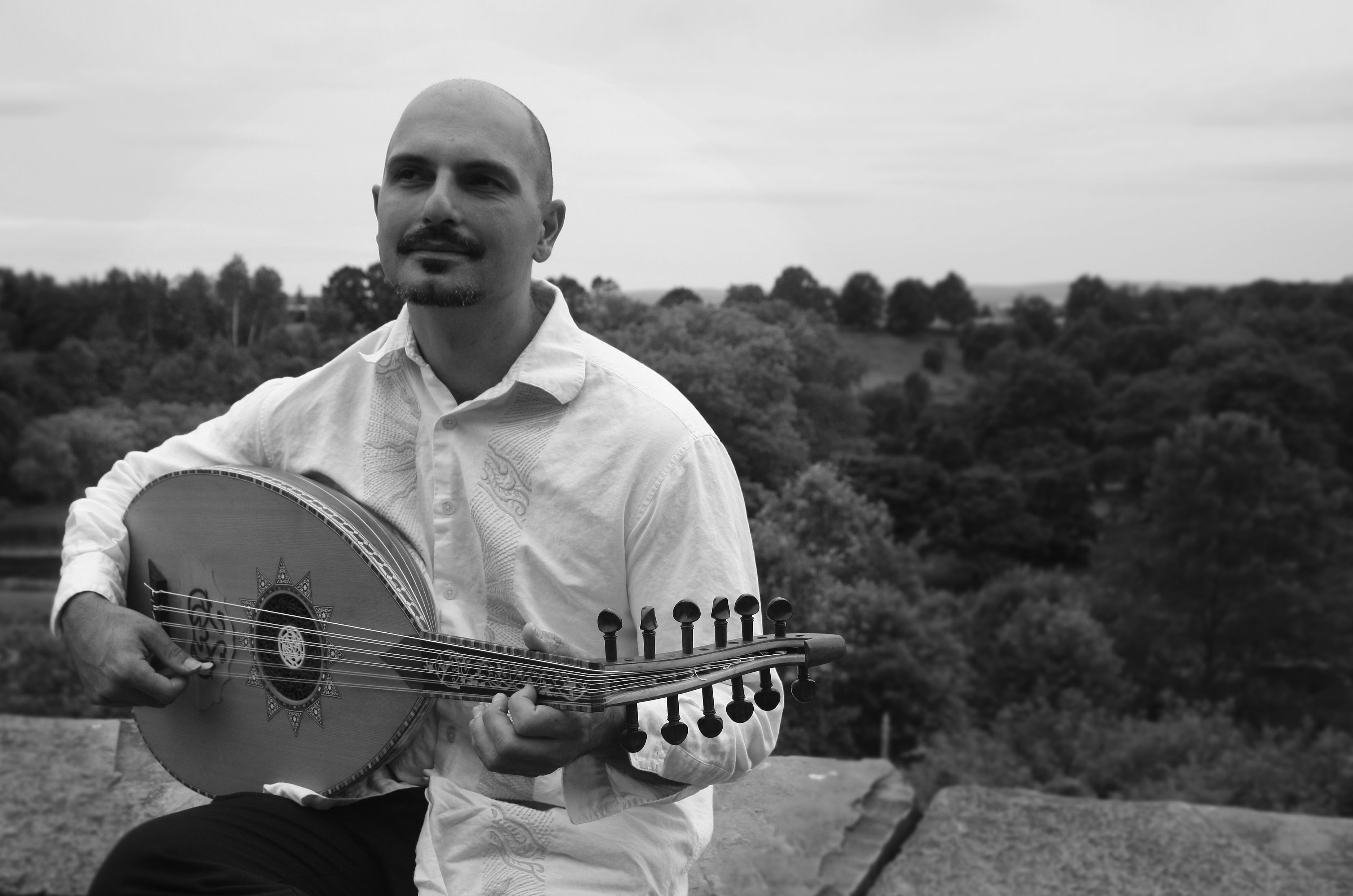Dara Anissi Lake Champlain Weekly
4
By Benjamin Pomerance

Photo left: Dara Anissi Ensemble
ONCE UPON A TIME, a Western classical musician and a traditional Middle Eastern musician sparked a debate about the merits of their respective art forms. The Western classical musician focused his comments on the perceived sparseness of the Middle Eastern craftsmanship, implying that it lacked the depth of Western aesthetics. “Your music doesn’t have a lot of notes,” the Westerner declared to the Middle Easterner. “It’s like a drop in the ocean.”
For a moment, the traditional Middle Eastern artist stared back into the eyes of his Western colleague. “Maybe it is a drop,” he responded. “But our drop is a tear.”
Dara Anissi repeats this story now, balancing on the verbal tightrope of trying to describe one’s own work. He left Iran at a time that his memory will not reach, a two-year-old child fleeing with his family from the vice grip of the Ayatollah Khomeini. Revolution bubbled in their homeland when they departed in 1975, planning to return when the danger passed. In western New York State, however, a new home became more of a home than they ever expected, and the return journey never occurred. For a lifetime, he has been an American.
His grandfather was a poet. His father, now retired, was a doctor, whose residency in western New York became the deciding factor for the family to stay. His mother had lived in England in the ’60s. “Paul was her favorite,” Anissi
states today, referring to Paul McCartney, his mother’s favorite Beatle. When her son was 5 years old, she bought a steel-string guitar for him and lessons from a teacher in the canal-side community of Pittsford, a suburb of Rochester. At first, music for him meant exercises from lesson books, a pedestrian academic pursuit.
But then the man who will perform with two of his closest collaborators for Hill and Hollow Music on Nov. 19 and 20 heard a sound resembling nothing that he had ever played or heard before. It was the music of Jimi Hendrix, a roll-up of angst and power, sermonizing with equal parts sprawling glory and devil-may-care. Suddenly, the 7th-grade kid in Pittsford wanted to do nothing else but play the guitar with tone-bending ferocity, flooding his soul with the lightning of the electric blues.
Then he heard his first helping of what would ultimately become known as progressive rock, and he decided that he wanted in on that party, too. King Crimson, Pink Floyd, the early editions of Genesis and, above all, Jethro Tull, the British band fronted by a flute-playing mad scientist inspired equally by J.S. Bach and Eric Clapton. “Ian Anderson, I could actually sing his songs in my range,” Anissi recalls of his deep plunges into Jethro Tull’s albums. “So, I could play his parts on the guitar and actually sing along with them, and I did, over and over.”
In high school, he assembled a group of his own. “The band was everything for all of us,” he declares. “It was our identity.” He translated that identity into an acceptance letter from Ithaca College, enrolling in 1991 as a music composition major. On that hilltop above Cayuga Lake, his diet became increasingly omnivorous. With his friends, he formed a Celtic group. He continued his explorations into just how Jethro Tull could sound the way they did. With Ed Flower, a widely recorded former student of Spanish master José Tomás, he studied classical guitar.
Even then, he could not get enough. “The expres- sion,” he answers when asked why music surges within him to heights that even he, only half-jokingly, refers to as obsessive. “The infinite variety of ways that instruments can sound together. The ways that the right combination of sounds can completely transport you from a mundane moment to complete ecstasy.”
He pauses for a moment. “If I had a religion,” he concludes earnestly, “it would be music, I suppose.”
And finally, after all of these wanderings, the music brought him back to the land that he could not remember. With his Ithaca College degree in hand, he traveled to Boston, pursuing a master’s in psychology. One day, browsing through a music shop, he noticed an album featuring compositions for the ‘oud, a fretless string
Find Us
Dara Anissi resides in Ithaca, NY with his wife and various pets.
Search
About This Site
Dara Anissi plays oud and guitar. He writes original pieces for both instruments with influences from Middle Eastern music, Jazz, Blues, Classical, and Celtic music.
Contact Dara
You can contact Dara directly at anissi.dara@gmail.com
Or use the contact form on this site.
About Dara
Dara Anissi plays oud and guitar. He writes original pieces for both instruments with influences from Middle Eastern music, Jazz, Blues, Classical, and Celtic music.
Latest News
-
Dara AnissiDara Anissi Lake Champlain Weekly December 21, 2022
-
 Dara Anissi on WBVR Tuesdays With The Band
December 11, 2018
Dara Anissi on WBVR Tuesdays With The Band
December 11, 2018
-
Dara AnissiHank and Cupcakes April 3, 2018
-
 Nowruz 2018!
April 2, 2018
Nowruz 2018!
April 2, 2018
-
 Like Hugging a Goat
April 2, 2018
Like Hugging a Goat
April 2, 2018
